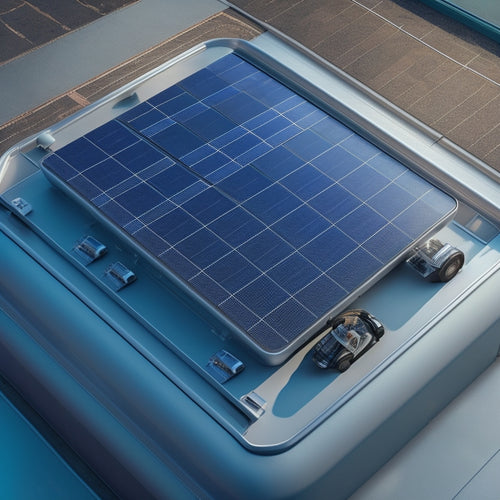
What Are the Best Solar Batteries for Home Energy Storage
Share
When selecting the best solar battery for home energy storage, you should consider reputable brands like Tesla, LG, and Sonnen, which offer high-performance products and peace of mind. Key features to evaluate include efficiency ratings, capacity options, depth of discharge, and warranty and durability. The type of battery chemistry, such as lithium-ion or lead acid, also plays a vital role. By balancing performance, cost, and features, you can find the ideal solution for your energy needs. Now, take the next step in exploring the world of solar batteries to uncover the perfect fit for your home energy storage system.
Key Takeaways
- Consider reputable brands like Tesla, LG, and Sonnen for high-performance solar batteries with proven track records and strong customer reviews.
- Look for batteries with high round-trip efficiency ratings to maximize usable energy and minimize energy waste.
- Choose a battery with a capacity that matches your energy usage and solar panel size, and consider depth of discharge (DOD) for greater capacity and lifespan.
- Evaluate warranty terms and expected lifespan, as well as the overall value of the battery based on performance, cost, and features.
- Research and compare different battery types, such as lithium-ion, lead acid, and flow batteries, to find the best fit for your home energy storage needs.
Top Solar Battery Brands
When it comes to selecting the ideal solar battery for your home energy storage system, the brand you choose plays a crucial role in ensuring reliability, efficiency, and overall performance. A reputable brand can provide you with peace of mind, knowing that your investment will last for years to come.
You want a brand that's committed to innovation, quality, and customer satisfaction. You should look for brands with a strong reputation in the industry, backed by positive customer reviews and ratings. Researching customer feedback will give you understanding into the brand's product performance, durability, and customer support.
A brand with a proven track record of supplying high-quality products and excellent customer service is more likely to provide you with a reliable and efficient solar battery.
Some top solar battery brands to evaluate include Tesla, LG, and Sonnen. These brands have established themselves as leaders in the industry, offering high-performance products with advanced features and exceptional customer support.
Key Features to Consider
What sets a high-quality solar battery apart from the rest? As you research and compare different options, you'll want to take into account several key features that impact performance, cost, and overall value.
When evaluating solar batteries, you should prioritize the following:
-
Efficiency ratings: Look for batteries with high round-trip efficiency ratings, which measure the amount of energy stored versus the amount available for use. Higher efficiency ratings mean more of your generated energy is usable.
-
Capacity options: Reflect on the capacity you need based on your energy usage and the size of your solar panel system. Larger capacities may be necessary for larger homes or those with higher energy demands.
-
Depth of discharge (DOD): A higher DOD indicates a battery can be safely drained to a lower level, increasing its overall capacity and lifespan.
- Warranty and durability: Assess the warranty offered and the battery's expected lifespan to guarantee you're getting a reliable and long-lasting solution.
Battery Types and Chemistries
Frequently, homeowners find themselves overwhelmed by the numerous battery types and chemistries available for home energy storage. There are several options to choose from, each with its unique characteristics, advantages, and disadvantages. Understanding the different battery types and chemistries is essential in selecting the best solar battery for your home.
Here's a summary of the most common battery types and chemistries:
| Battery Type | Chemistry | Characteristics |
|---|---|---|
| Lead Acid | Flooded, AGM, Gel | Affordable, well-established technology, but heavy and less efficient |
| Lithium Ion | Lithium Cobalt Oxide, Lithium Iron Phosphate | High energy density, long lifespan, and low maintenance, but more expensive |
| Sodium Ion | Sodium Nickel Manganese Cobalt Oxide | Lower cost than lithium-ion, but still in development |
| Flow Battery | Vanadium Redox, Zinc Bromine | Scalable, long-duration energy storage, but complex and expensive |
| Nickel Cadmium | Nickel Oxide Hydroxide, Cadmium | Toxic and environmentally hazardous, but still used in some applications |
When choosing a battery, consider the lithium ion advantages, such as high energy density and long lifespan, as well as the lead acid limitations, like its heavy weight and lower efficiency. By understanding these characteristics, you can make an informed decision for your home energy storage needs.
Cost and Warranty Comparison
Several factors influence the overall cost of a solar battery, including the type and chemistry, capacity, and brand. As you research the best solar batteries for your home energy storage needs, it's crucial to take into account these factors to guarantee you get the best value for your money.
When comparing costs, you'll want to take into account the following:
-
Battery Lifespan: Look for batteries with a longer lifespan to minimize replacement costs over time. A longer lifespan typically translates to a higher upfront cost, but it can pay off in the long run.
-
Efficiency Ratings: More efficient batteries will charge and discharge more effectively, reducing energy waste and saving you money on your energy bills.
-
Capacity and Depth of Discharge (DOD): A higher capacity battery with a higher DOD will provide more energy storage and flexibility, but may come at a higher cost.
- Warranty and Support: A thorough warranty and reliable customer support can provide peace of mind and protect your investment.
Installation and Maintenance
Get your solar battery system up and running smoothly by considering the installation and maintenance aspects.
You'll want to guarantee a seamless installation process, which typically involves evaluating your home's energy needs, designing a customized system, and installing the necessary components. It's vital to work with a reputable installer who can guide you through the process and confirm that your system meets local building codes and regulations.
Once your system is up and running, it's important to follow proper maintenance tips to maximize its performance and lifespan.
Regularly inspect your system for signs of wear and tear, and perform routine cleaning to guarantee peak energy production. You should also monitor your system's performance remotely to identify any potential issues before they become major problems.
Additionally, schedule annual maintenance checks with a certified technician to ascertain that your system is operating at peak efficiency.
Frequently Asked Questions
Can I Use Any Inverter With a Solar Battery System?
You'll need to guarantee inverter compatibility with your solar battery system, considering factors like voltage, power rating, and communication protocols, as different battery types, such as lithium-ion or lead-acid, have specific inverter requirements.
How Often Should I Inspect My Solar Battery System?
You're probably thinking, 'I've got a solar battery system, I'm set for life!' Not quite. You should inspect your system every 3-6 months to guarantee peak performance, checking for signs of wear, corrosion, and loose connections - it's essential battery maintenance.
Are Solar Batteries Susceptible to Cyber Attacks?
You're right to worry about cybersecurity - solar batteries can be vulnerable to attacks. You should verify your system has strong cybersecurity measures in place to mitigate battery vulnerabilities, protecting your energy storage and home network from potential threats.
Can I Add More Batteries to My System in the Future?
You can easily scale up your system in the future by adding more batteries, as long as you guarantee compatibility with your existing setup, allowing for seamless future expansion and flexibility in your energy storage needs.
Will Solar Batteries Work During a Power Outage at Night?
During a nighttime power outage, you'll rely on your solar battery's stored energy, and its performance will depend on factors like depth of discharge and capacity. Look for batteries with high outage reliability to guarantee a steady supply of power when you need it most.
Conclusion
You've got the power to take control of your energy storage needs, and with the right solar battery, you'll be cooking with gas. When it comes to making an informed decision, it's vital to weigh the pros and cons of each brand, considering key features, battery types, and cost. By doing your due diligence, you'll be well on your way to utilizing the sun's energy and reducing your reliance on the grid. The ball is now in your court – make the most of it!
Related Posts
-

Top Solar Panels for Car Battery Maintenance
When selecting top solar panels for car battery maintenance, consider high-efficiency models with high wattage output...
-

Safety First: Why Seniors Need Advanced Vehicle Features
As you get behind the wheel, you're likely unaware that seniors are 16% more likely to be involved in a fatal car cra...
-

Safely Staying on Course: 5 Essential Lane Tips
You're about to take your driving skills to the next level by mastering the art of staying in your lane. First, inves...


